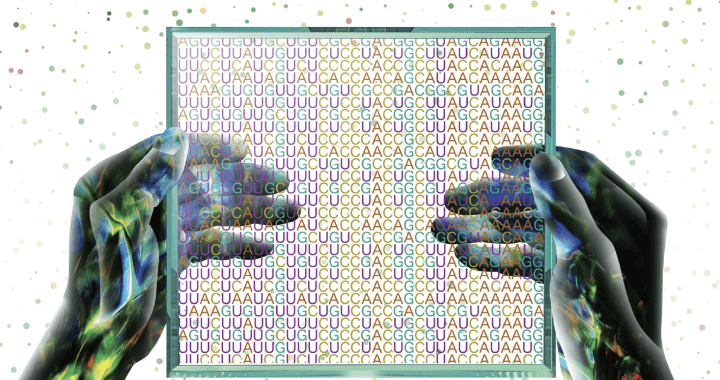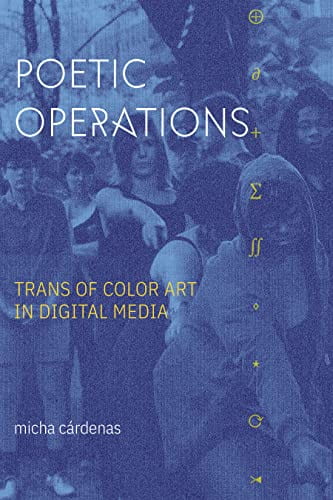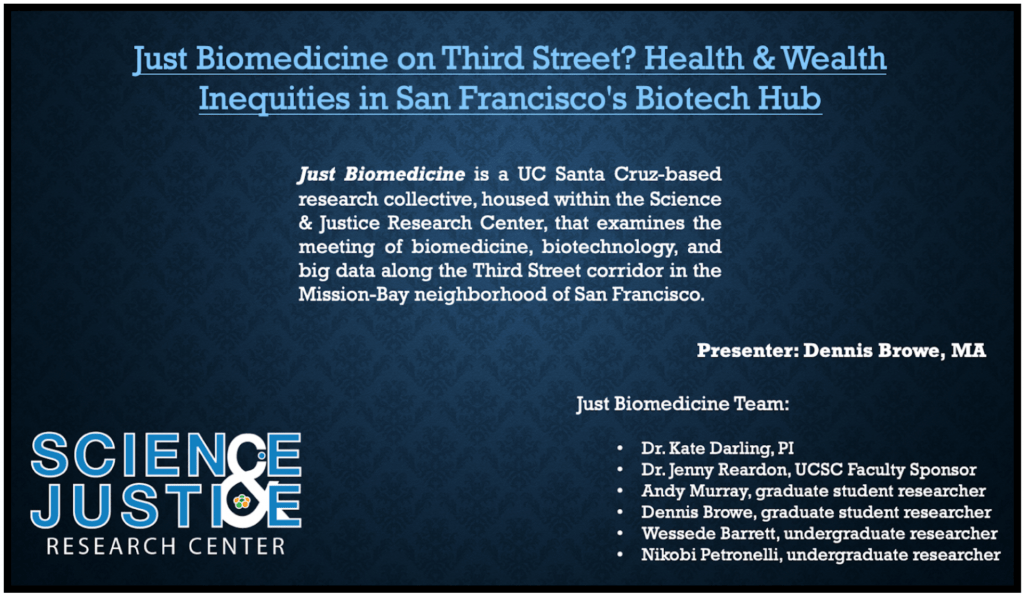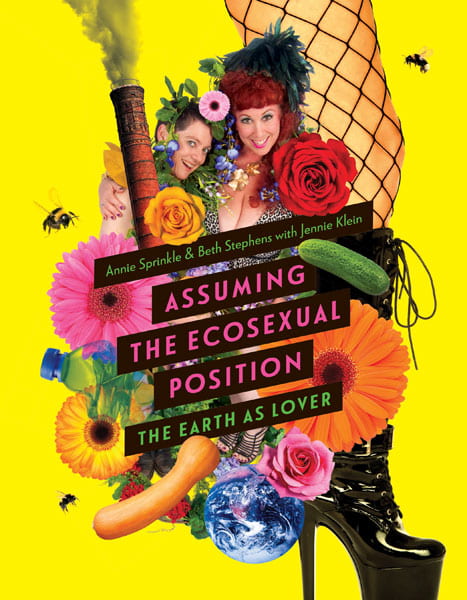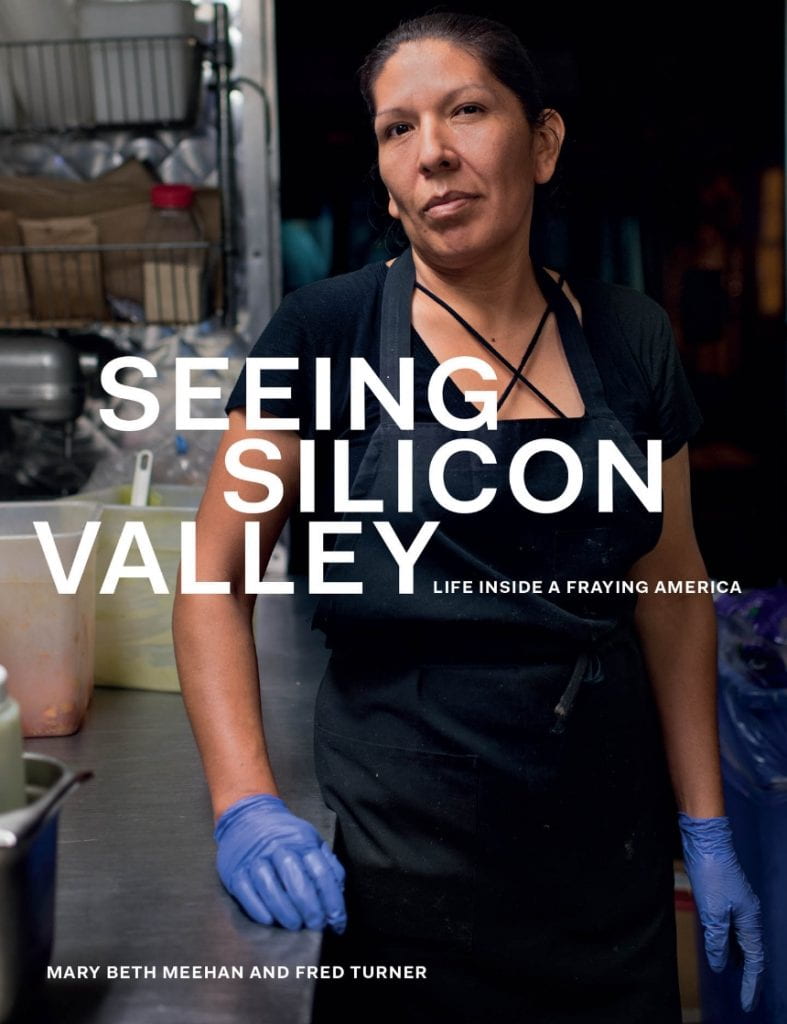Volume 15
Director’s Letter: Welcome to Science & Justice
As we look forward to the year to come, we appreciate the chance to share with you our accomplishments of the last year.
Science & Justice continues to be in the headlines, making a critical difference in California, the nation and globally. Our faculty and students were out front both in the press, and in their many new publications and interviews, addressing pressing issues, including public trust in science and medicine, and how COVID has revivified or changed existing debates about race and racism in different trans/national contexts. Members of our Theorizing Race After Race working group published critical dialogues about COVID, Race and Racism in The Foundry. Members of the Unjustly Exposed documentary reported on their collaborative class with Georgetown. As part of SJRC’s long standing goal to transform institutional structures so that they support a much more diverse range of scholars, we launched projects to Build Diversity in Sociology and Science and Technology Studies, as well as received a grant from the National Science Foundation for our Leadership in the Ethical and Equitable Design (LEED) of STEM Research initiative. Our faculty also participated in workshops hosted by the National Academies of Science, Engineering and Medicine, for example, the Educational Pathways for Black Students in Science, Engineering, and Medicine; Exploring Barriers and Possible Interventions: Proceedings of a Workshop and the Launch Workshop for the Consensus Study on Creating A Framework for Emerging Science, Technology and Medicine.
Our events continued to highlight the unusual and inspiring collaborations and conversation Science & Justice creates. Participants engaged with us from all over the nation and world, including over the last year remotely from Denmark and Mexico, and universities throughout the United States.
Despite the ongoing pandemic, the 2021-22 academic year also produced much to celebrate. Congratulations to many affiliated faculty who were promoted and received tenure – and those who published books – a special feat of the industries, especially during a pandemic! We look forward to finally celebrating this coming year. Congratulations to collaborator Alondra Nelson for being appointed the Deputy Assistant to the President and performing the duties of the Director of the White House Office of Science and Technology Policy (OSTP); and Karen Miga for being named one of TIME’s 100 Most Influential People! Congratulations also to founding Training Program Fellow, Colin Hoag, Assistant Professor of Anthropology at Smith College, who published a book on water and ecology in Lesotho, titled “The Fluvial Imagination: On Lesotho’s Water-Export Economy” from University of California Press. We will celebrate the book launch next year. As well as to Sociology and Statistics undergraduate student Aisha Lakeshman who was awarded honors for her senior thesis on, “Normalizing “Slow Science” in the Case of RNA-Therapeutics: Research Pace and Public Trust in Science,“ researched that emerged from her work on our partnership with C.O.A.S.T. team (Center for Open Access Splicing Therapeutics).
As we plan the year ahead, we are especially excited to begin gathering in-person again! We will do our best to keep hybrid activities available. Top activities we look forward to are our Mellon Foundation Sawyer Seminar on Race, Empire, and the Environments of Biomedicine with Jennifer Derr and The Humanities Institute, working with Associate Director of Teaching James Doucet-Battle to advance Build Diversity in Sociology and Science and Technology Studies, launching a faculty recruitment in Critical Race STS and a Hub to build a Science and Justice minor with the Critical Race and Ethnic Studies Department, and the launching of our LEED initiative.
We are ever thankful for the guidance and support our steering committee and board of advisors continue to provide us, and for the support of many units and divisions on campus.
Jenny Reardon
Founding Director of the Science & Justice Research Center, Professor of Sociology, UC Santa Cruz
Science & Justice Leadership Team
Founding DIRECTOR | Jenny Reardon, Professor of Sociology
DIRECTOR of Teaching the SJTP | James Doucet-Battle, Associate Professor of Sociology
CENTER MANAGER | Colleen Stone
GRADUATE STUDENT RESEARCHER | Chessa Adsit-Morris, History of Art and Visual Culture
Science & Justice Steering Committee
Jennifer Derr, Associate Professor of History
James Doucet-Battle, Associate Professor of Sociology
Lars Fehren-Schmitz, Professor of Anthropology
Lise Getoor, Professor of Computer Science
Dee Hibbert-Jones, Associate Professor of Digital Art and New Media
Jaimie Morse, Assistant Professor of Sociology
Jenny Reardon, Professor of Sociology
Matt Sparke, Professor of Politics
The Science & Justice Mission
The Science & Justice Research Center at the University of California, Santa Cruz is a globally unique endeavor that innovates experimental spaces, engages in collaborative research practices, and fosters emerging alliances between seemingly disparate sectors, disciplines and communities. Biomedical innovation, species extinction, toxic ecologies, access to healthcare, and many other contemporary matters of concern provoke questions that traverse multiple intellectual, institutional and ethico-political worlds. Science & Justice generates modes of inquiry and empirically rigorous research that address these enormous challenges and support livable worlds. The Center is home to the Science and Justice Working Group, the Science and Justice Graduate Training Program (SJTP) and sponsored research projects. The initiative builds on the UCSC campus’ historic commitments to socio-ecological justice and strengths in science studies and interdisciplinary research.
Sustaining a Vibrant SJRC Community
The Science & Justice Research Center supports a vibrant, collaborative community. Located in Oakes College, SJRC hosts visitors from across the UC system and around the world. The SJRC community is committed to sustaining an experimental ecosystem for novel ideas, dialogues, methods and collaborations. The Science & Justice Working Group remains the heart of our collective work. We also host regular reading groups and experimental mixers with affiliated graduate students and faculty who seek to further investigate the meanings and practices of science and justice.
Visiting Scholar Program
Since 2009, the SJRC Visiting Scholars Program has been a vibrant hub for interdisciplinary scholars across the UC-system, the nation and the globe. The Science & Justice Research Center offers opportunities for visiting scholars at all levels of their career (regardless of institutional affiliation) to participate in the community through research collaborations, reading groups and experimental mixers. In the 2021-2022 academic year, the Center continued to host one long-term visiting scholar, two remote exchanges, and hosted one on campus visitor: refer to Appendix 1 to learn more about our visitors.
Highlights from the Science & Justice Working Group, Experimental Mixers, Writing and Reading Groups
The Science & Justice Working Group (SJWG) provides a convivial and novel space to cultivate emerging connections, spark new questions for research, and nurture our communities’ collaborative ties. In addition to formally convening the SJWG, our informal experimental mixers are a lively and open space for all SJRC community members.
Below are some highlights of the year’s events (all events are listed in Appendix 2).
On October 06, the Center began the academic year by hosting our annual Meet & Greet. In addition to a chance to celebrate the new academic year and enjoy each other’s company, the annual gathering is always a great chance to welcome new members, welcome back others, and share current work to foster emerging collaborations.
Chancellor’s Postdoctoral Fellow Melina Packer kicked off the Works-in-Progress Series on October 13 by presenting their research on Toxicant Masculinity. Packer offered a critical feminist historiography of toxicology, also known as “the basic science of poisons.” Applying queer feminist theory and methods, Packer’s project urges contemporary toxicologists to re-situate the science of poisons in its sociopolitical context, confronting the discipline’s military-industrial history while centering the lived experiences of over-exposed communities, for both better science and environmental justice.
Our Works-in-Progress series continued on October 27 with one of our remote visiting scholars, Rebecca Herzig, Professor of Gender and Sexuality Studies at Bates College on Science, Justice, and University Abolition. This talk, part of a larger work-in-progress on US higher education, drew together left abolitionist approaches to the university and decolonial, anti-capitalist, and queer feminist critiques of science. Specifically, the talk took up Boggs et al’s (2019) call to reckon with US universities’ complicity with settler colonial and racial capitalist regimes of accumulation by considering the distinctive positioning of contemporary “STEM,” ideologically and materially, within those regimes. Thinking of Science & Justice within and beyond the carceral university, the talk suggested, requires struggle with academic science’s ongoing conditioning of twenty-first century racial-capitalist orders.
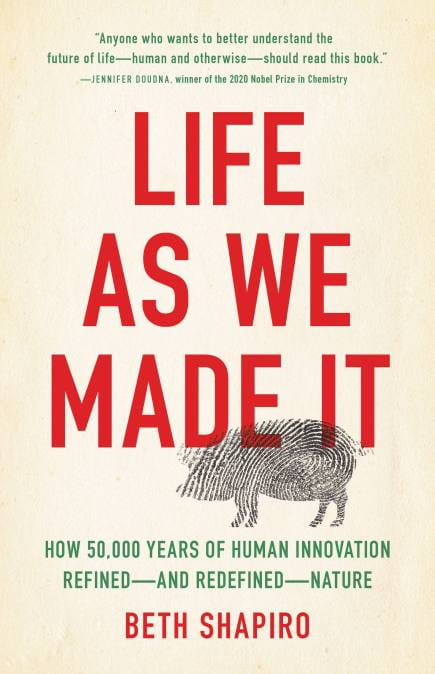
Life as We Made It: How 50,000 Years of Human Innovation Refined—and Redefined—Nature (Basic Books, 2021)
On November 10, we celebrated the launch of SJRC affiliate faculty Beth Shapiro’s new book, Life as We Made It: How 50,000 Years of Human Innovation Refined—and Redefined—Nature (Basic Books, 2021). Science & Justice Training Program Fellows, Jonas Oppenheimer (Biomolecular Engineering and Bioinformatics) and Jenny Pensky (Earth & Planetary Sciences) presented findings from their collaborative research project exploring the relationships between “invasive” plants, botanical gardens, and colonialism – as well as – put their work into conversation with Shapiro’s Life as We Made It. Learn more about Life as We Made It in this campus news article: https://news.ucsc.edu/2021/10/shapiro-book.html
On January 19, we continued the Works-in-Progress series with Daphne Martschenko, a Research Fellow at the Stanford Center for Biomedical Ethics and collaborator Sam Trejo, an Assistant Professor in the Department Sociology and a faculty affiliate of the Office of Population Research at Princeton University, on how ethical, anticipatory genomics research on human behavior means celebrating disagreement.
On February 07, with the department of Critical Race and Ethnic Studies along with Performance, Play and Design, we celebrated the launch of SJRC affiliate faculty micha cárdenas’ new book, Poetic Operations: Trans of Color Art in Digital Media, from Duke University Press at the Cowell Provost house. The book is available as a Kindle Edition on Amazon. Other formats are available at https://www.dukeupress.edu/poetic-operations.
On February 09, we heard from our long-time visiting scholar, Melissa Eitzel Solera, now with the Center for Community and Citizen Science at UC Davis. Eitzel Solera gave us a brief report on the achievements from the work at SJRC as an NSF Science, Education, and Engineering for Sustainability postdoctoral scholar, some highlights of new collaborative projects at Davis, and workshopped papers associated with the recently-published Modeler’s Manifesto.
On February 23, we heard from visiting scholar, Abril Saldaña-Tejeda in a talk titled, “Global divisions of health; bioethical principles, practices and regulations on human genome editing in Latin America.” Saldaña-Tejeda, Associate Professor of Sociology at the Department of Philosophy, Universidad de Guanajuato, Mexico, asked how scientific and non-scientific communities of knowledge production in Latin America have historically perceived ethical concerns regarding human genome editing and other reproductive technologies (MSRTs). Saldaña-Tejeda’s project explored how current frameworks, concerns and discourses in the United States and Europe engage with (or contradict) those in Latin America. Over the summer, Saldaña-Tejeda co-authored an article, “Policy landscapes on human genome editing: a perspective from Latin America”, published in Science & Society’s Trends in Biotechnology.
Later in the day on February 23, S&J colleague, Professor of African American studies, and founding director of Princeton University’s Ida B.Wells JUST Data Lab, Ruha Benjamin, spoke at the 38th annual UCSC Dr. Martin Luther King Jr. Memorial Convocation. The talk was moderated by SJRC affiliated faculty Camilla Hawthorne, Associate Professor of Sociology. SJRC’s Theorizing Race After Race (TRaR) Working Group (which Professor Hawthorne co-leads) discussed Professor’s Benjamin’s work in advance of the talk. More in this campus news article: Distinguished sociologist and founding director of Ida B. Wells JUST Data Lab to headline MLK Convocation.
On April 13, we concluded the Works-in-Progress series with Visiting Scholar and Wellcome Trust Fellow Rachel O’Neill, an Assistant Professor in Media and Communications at the London School of Economics who is undertaking research on ‘wellness’ culture in the UK, with a particular focus on food and nutrition. Professor O’Neill is very much concerned with the cultural politics of wellness, including its gendered, classed, and racialised dimensions.
Justice Sparks Innovative and Original Research
The Science & Justice Research Center continues to be an exemplar of how to transform commitments to justice into collaborative research projects. We formulate new methods and institutional practices where scientists and engineers work alongside social scientists, humanists, ethicists, artists and diverse public communities. SJRC affiliates pursue local, regional, national, and international research collaborations on issues that inform and affect institutional and public policy.
In 2021-2022 the center focused on several ongoing projects. Members of our Theorizing Race After Race working group published critical dialogues about COVID, Race and Racism in UC Humanities Institute’s on-line platform, The Foundry. Sociology and Statistics undergraduate student Aisha Lakeshman was awarded honors for her senior thesis, “Normalizing “Slow Science” in the Case of RNA-Therapeutics: Research Pace and Public Trust in Science ,“ and outgrowth of research she did as part of our collaboration with C.O.A.S.T. (the Center for Open Access Splicing Therapeutics). Members of the Unjustly Exposed documentary led by Film and Digital Media Professor Sharon Daniel reported on their collaborative class with Georgetown. As part of SJRC’s long standing goal to transform institutional structures so that they support a much more diverse range of scholars, we launched projects to Build Diversity in Sociology and Science and Technology Studies as well as received a $400,000 grant from the National Science Foundation for the Leadership in the Ethical and Equitable Design (LEED) of STEM Research.
Funding Undergraduate and Graduate Research
SJRC assisted students in identifying and applying for campus funding to conduct original and collaborative research. Campus funding was awarded to undergraduate Science & Justice researchers through the Undergraduate Research in Science & Technology Endowment (Aisha Lakshman, Sociology, Statistics; Tee Wicks, Sociology), the Genomics Institute’s Research Mentoring Internship Program (Aisha Lakshman, Sociology; Ryleigh Hales, Biochemistry, MCD Biology Spring 2021; Jessica Singh, MCD Biology, Legal Studies Spring 2021), and the Institute for Social Transformation’s Building Belonging Program (Andrea Asher, Sociology, Human Biology Summer 2021-Summer 2022.
In 2021-22, SJRC also awarded 3 undergraduate students (totaling $ 2200) and 3 graduate students (totaling $10,000) funds to conduct original and collaborative research. The awards supported general living expenses, fieldwork or travel (as allowed by COVID-19 and shelter-in-place restrictions), presentation of work, and research. Dennis Browe (Sociology) conceptualized a half day symposium on ImaginACTivism as part of his work on Science & Justice’s Just Biomedicine Project, which he had a chance to co-present at the Precision Medicine and Society Conference at Columbia University in May 2021 in a talk titled, “From City of Love to City of Life: Revitalization and the Reconstruction of San Francisco’s Uneven Healthscapes” with UCSC Sociology Alum Andy Murray and Kate Darling (Assistant Professor of Sociology, University of Maine, Augusta). PhD candidate Chessa Adsit-Morris (HAVC) helped the group secure grants from the National Center for Advancing Translational Sciences, the National Institutes of Health, the UC Santa Cruz Office of Research, and the UC Santa Cruz Institute for Social Transformation for the LEED initiative.
For a complete list of the ongoing research our community conducted, refer to Appendix 3.
Creating a UCSC Ethics in Practice
At an increasing rate, many forms of scientific evidence are met not just with questions of curiosity and interest, but also with skepticism and mistrust. Healthcare systems are challenged by entrenched inequalities and profit motives. Algorithms encode bias into the heart of big data approaches to science and engineering. The next generation of leaders in biomedical and life sciences, environmental science, and engineering need to be adept at addressing these challenges. At SJRC, we believe this requires bold new approaches to ethics and research practice in STEM fields. We strive to exceed narrow standards for the ethical approval of science and prepare and support our students and faculty to be powerful stewards of socially robust and reflexive science. Our vision of good science exceeds simple compliance and strives towards institutional change. We work with affiliates to realize this in practice. Examples of our efforts from this year are described below.
A Model for Building Diversity and Interdisciplinarity
National calls for increased attention to diversity, equity, and inclusion in all phases of STEM research, from project inception to publication, have led to an increasing demand for scholars trained in STS who can provide guidance to STEM researchers and serve as collaborators on STEM research teams. Yet the lack of diversity in STS threatens to reproduce the same hierarchies of race, gender, class, and sexuality that have long been documented in STEM fields, as well as the broader societal barriers to equity and justice that these calls seek to address. While substantial resources have been allocated to address pipeline issues in STEM and to a lesser extent the social sciences, to our knowledge, few exist that specifically focus on training the next generation of STS scholars of color who can provide critical guidance and nuanced expertise on justice and equity concerns in STEM. Despite this growing demand, there is little guidance on best practices for fostering this integration or for evaluating its effects. As efforts to increase the diversity of both researchers and the researched in STEM have gained in prominence, the number of African and Indigenous descent PhDs working in STS remains low in the United States.
In 2021-2022 Science & Justice continued its history of initiating bold new collaborations and under the direction of Associate Professor of Sociology and SJRC Associate Director of Teaching James Doucet-Battle, we launched a study to Build Diversity in Sociology and Science and Technology Studies. We focussed our efforts on applying for a grant from the UC-HBCU initiative to strengthen UCSC’s efforts to attain and support graduate students. We worked closely with the Office of Research and the Division of Graduate Studies to coordinate staff and faculty in multiple divisions, departments, resource and cultural centers, and campus student success units to identify student and faculty needs and structural barriers to writing, receiving and supporting UC-HBCU grants. We created agreements and tools to better holistically address these needs and barriers. Our work is resulting in holistic institutional support from central administration while we build partnerships between UCSC and HBCU faculty.
Finally, we continued our work with Genomics Institute staff and faculty to collaborate on integrating a concern for ethics and justice into genomics research. James Doucet-Battle (Sociology), Jenny Reardon and Colleen Stone worked with Lars Fehren-Schmitz (Anthropology), Angela Brooks (BME), Karen Miga (BME) and Zia Isola to reconceive Genomics and Society work. In this, we applied for, but were not awarded, SEED Funding for an Early-Stage Initiative through the UCSC Office of Research for “Training tomorrow’s leaders at the intersection of Genome Sciences, Policy and Society.” We, however, continue our work together and are seeking alternate sources of support. Professor Karen Miga also joined our effort to create a Science and Justice minor. James Doucet-Battle and Angela Brooks worked together on UC-HBCU training program grants. Jenny Reardon and Colleen Stone with Jeremy Sanford (MCD Biology) and Michael Stone (Chemistry) continued working in The UCSC Center for Orphan-disease Alternative Splicing Therapeutics (C.O.A.S.T.). C.O.A.S.T seeks to accelerate the discovery of precision therapies for rare diseases by exploiting the chemical language of ribonucleic acid (RNA), while addressing the questions of ethics and justice raised by this novel area of research. Finally, drawing on work with C.O.A.S.T., Aisha Lakshman (Sociology, Statistics) wrote a senior thesis, “Normalizing “Slow Science” in the Case of RNA-Therapeutics: Research Pace and Public Trust in Science.“ Lakshman, who was awarded honors, used her two disciplines to interpret datasets to demonstrate social problems and catalyze social change. In May 2022, Lakshman presented her research poster at UC Global Health Day hosted by UC Santa Cruz.
This year we also extended our efforts to create a more robust approach to ethics grounded in interdisciplinary collaboration through our new partnership with the Institute for the Biology of Stem Cells. Working with Camilla Forsberg (Biomolecular Engineering) and Lindsay Hinck (Molecular, Cellular and Developmental Biology), we created a Science and Justice training component for the successful EDUC 4: CIRM Research Training Grant “CIRM Scholar” Award. We look forward to working with them, and to expanding training opportunities in stem cell research to include a critical focus on questions of ethics and justice. See this UCSC news story for more information.
Leadership in the Equitable and Ethical Design (LEED) of STEM Initiative
To clarify, review, and revitalize the roles and value of engaging bioethicists and scholars in the social sciences, humanities, and the arts in STEM research, SJRC launched a national and international collaborative initiative informally called LEED. Leadership in the Ethical and Equitable Design (LEED) of STEM Research proceeds in three phases: background research; drafting of LEED Principles and Practices; and International Discussion and Write-Up of LEED Principles and Practices. SJRC Founding Director and Professor of Sociology Jenny Reardon was the PI of a successful grant application to the National Science Foundation ER2-Ethical & Responsible Research ($399.994) that will support the first phase of the project. Sandra Soo-Jin Lee (Columbia University) and Mildred Cho (Stanford) are the co-PIs, and Evelynn Hammonds (Harvard), Aaron Panofsky (UCLA), Malia Fulteron (University of Washington), and Sara Goering (University of Washington) are senior personnel. The LEED group wrote its first article, which Cell magazine favorably reviewed. We anticipate its publication in Cell next year.
For a complete list of the ongoing research our community conducted, refer to Appendix 3.
Science & Justice Training Program
Science & Justice Graduate Training Program
The SJRC is the home to the globally unique Science & Justice Training Program (SJTP). The program teaches graduate students from across all five divisions how to collectively address the moments where questions of science meet questions of justice.
Started in 2010 with a grant from the National Science Foundation, the internationally-recognized Science & Justice Training Program (SJTP), draws together masters, early career PhD students and faculty from across all five Divisions of the University. Students who took the training program’s introductory course Science & Justice: Experiments in Collaboration in the Winter 2020 term with SJRC Founding Director Jenny Reardon presented on their project Ecological and Social Perspectives on Restoration, in conjunction with SJRC affiliate faculty Beth Shapiro’s new book, Life as We Made It: How 50,000 Years of Human Innovation Refined—and Redefined—Nature (Basic Books, 2021)! (poster – PDF).
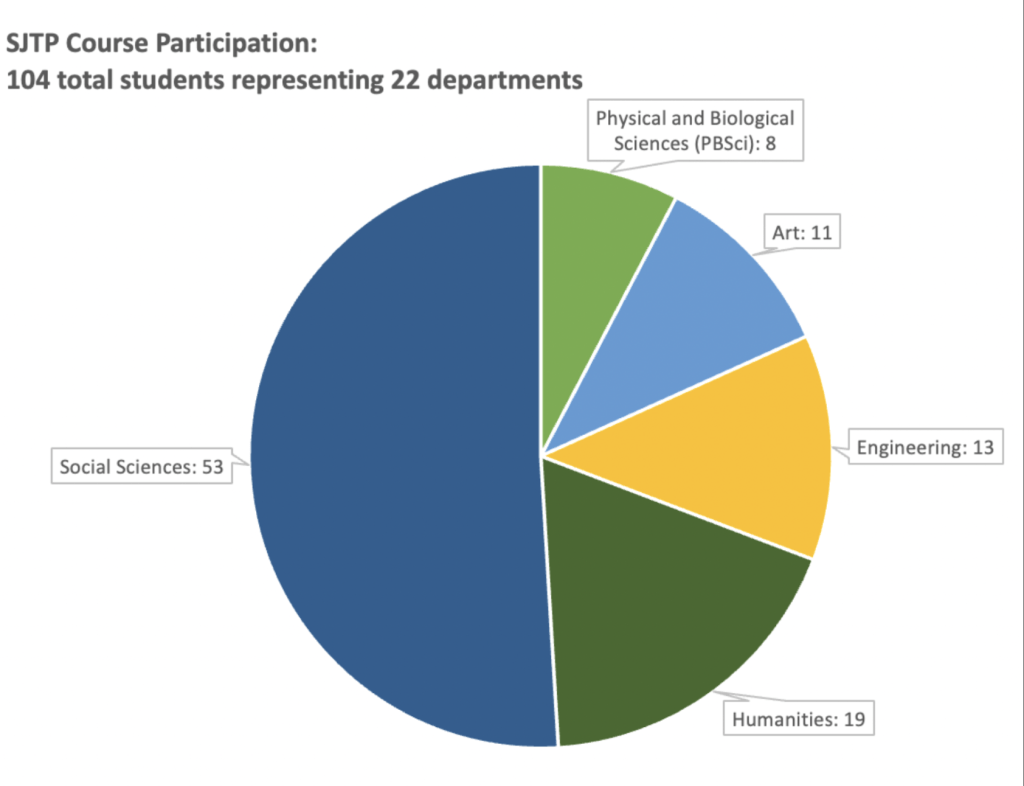 Students who enrolled in the seminar offered in Winter 2022 taught by SJRC Director of Teaching James Doucet-Battle, entered the program in Spring and Fellows began conducting original research and collaborative projects over the summer. In the 2021-22 academic year, Doucet-Battle will mentor graduate students who chose to go on to get a Science and Justice graduate certificate. The seminar will be offered again in Winter 2024.
Students who enrolled in the seminar offered in Winter 2022 taught by SJRC Director of Teaching James Doucet-Battle, entered the program in Spring and Fellows began conducting original research and collaborative projects over the summer. In the 2021-22 academic year, Doucet-Battle will mentor graduate students who chose to go on to get a Science and Justice graduate certificate. The seminar will be offered again in Winter 2024.
Over the last 12 years, the introductory course for the Science & Justice Training Program has trained 104 graduate students representing 22 different UC Santa Cruz departments in creative approaches to science and justice. Participating in the program helps students build their careers and catalyzes new collaborative initiatives within the university. Our students have already had considerable early career success, demonstrated by their successful applications for fellowships, grants, postdoctoral positions and entrepreneurial efforts.
Building Science and Justice Undergraduate Curriculum
UC Santa Cruz offers a wide range of courses across its many disciplines that address the relationships between science, society and justice. Science & Justice affiliates have long desired to create a large core course that would teach undergraduates the fundamentals of Science and Justice. Over this last year, SJRCs Steering Committee continued to discuss the potential with faculty and staff across campus for creating a minor in Science and Justice. A Science and Justice minor could offer students an opportunity to learn the transdisciplinary field of science and justice studies while at the same time receiving training in their major discipline. SJRC will continue to gather faculty to discuss and conceptualize new courses and a proposal for a minor in Science and Justice to be hosted by the newly established Critical Race and Ethnic Studies (CRES) department. With Christine Hong (Chair of CRES), we applied for campus seed funding made available through the Office of Research for a Science and Justice Minor Hub and Research Cluster to develop the minor over the 2021-2022 academic year. While it was not awarded, it was underwritten by the Humanities Division. Over the Summer 2022, SJRC and CRES began inviting affiliated faculty to join the Hub who will meet next year.
Funding the Future of Science & Justice
Director Jenny Reardon and Manager Colleen Stone with the advice of the SJRC Steering Committee continue to work closely with University Relations and Development Officers to develop strategies for funding the future of science and justice at UC Santa Cruz.

SJTP Fellows Ian Carbone and Derek Padilla with
undergraduate Artist-in-Residence Kiko Kolbi inside greenhouse.
On November 03, we hosted a Giving Day campaign to support SJTP Fellows (pictured), case statements and concrete fundraising goals for the research center and the graduate training program. Our immediate grant-writing and fundraising goals include fellowship support for the Science & Justice Training Program graduate fellows, and support for Center staff and faculty.
With the support of the SJRC Steering Committee, we have helped faculty across campus raise over $10 million in grants. Currently, the SJRC is directly managing nearly $750,000 in funded research and training initiatives (refer to Appendix 5 for a list of active grants and Appendix 8 for a full breakdown).
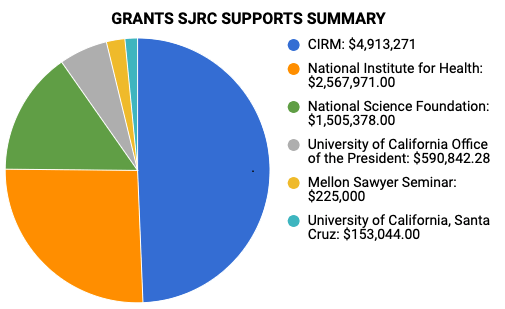 We will continue to pursue grants to support and endow the Center’s collaborative research, training and advocacy activities.
We will continue to pursue grants to support and endow the Center’s collaborative research, training and advocacy activities.
Additional grant funding and donor contributions will secure our efforts to build an internationally recognized program that trains the next generation of scholars to responsibly take up the important social and scientific problems of our time. Higher levels of grant writing support will help us to develop our research infrastructure and our ability to obtain large-scale grants. Our ambitious fundraising goals and sustained efforts to pursue grant and foundation funding will continue the growth and vitality of our work and community.
As we look to the future, we seek to continue to build SJRC as a hub for extramural funding of research projects with links to science and justice.
Reflecting on Our Progress and Looking Ahead
The 2021-22 academic year marked the end of our tenth year as a research center. The SJRC has become a dynamic and collaborative infrastructure for training the next generation of humanities, natural and social science researchers and engineers who are trained to pursue their research and make discoveries in ecosystems where ethics and justice are primary concerns. The Center and its affiliated faculty remained key partners in creating innovative training, curriculum, and research across campus that recognizes the questions of ethics and justice at stake as we forge knowledge and innovations. In particular, we continued to deepen our collaborations with our colleagues in Science and Engineering, particularly through future HBCU Summer Undergraduate programs; and our colleagues in Critical Race and Ethnic Studies to develop an undergraduate minor in Science and Justice. We also deepened and extended our national and international networks through the launch of our LEED initiative.
Reflecting on our progress and growth, we continue to refine Center practices, and document them in the SJRC Handbook. Center Manager, Colleen Stone continued to meet with Director Jenny Reardon and Sociology Department Manager Jessica Lawrence to better understand and delineate responsibilities of administrative tasks related to running the Center. Reardon and Stone also continued to envision specific ways in which SJRC can provide effective support to the educational and research efforts of our diverse faculty community.
We are committed to developing future research collaborations, and seek collaborators from all divisions at UCSC and in the UC system, as well as in the community. We will continue to provide a critical and dynamic space that supports the diverse needs of our faculty, researchers, students, and staff.
As we plan the year ahead, we are especially excited to begin gathering in-person again! We will do our best to keep hybrid activities available. Top activities we look forward to are our Mellon Foundation Sawyer Seminar on Race, Empire, and the Environments of Biomedicine with Jennifer Derr and The Humanities Institute, launching a faculty recruitment in Critical Race STS and a Hub to build a Science and Justice minor with the Critical Race and Ethnic Studies Department, working with SJRC Director of Teaching James Doucet-Battle to advance Building Diversity in Sociology and Science and Technology Studies, and launching our LEED initiative.
SJRC’s promise is simple and bold. The benefits are manifold: improved outcomes not just for humans, but for the many non-human lives as well; approaches to science and technology that balance prosperity and justice, health, ecological survival and ethics. Our affiliated researchers and interdisciplinary teams have built decades of scholastic expertise examining the life sciences and biomedicine, health, environment, food, and racial and economic justice. The Center provides the critical milieu in which the creative sharing of this expertise leads to novel justice praxis and knowledge sharing that fosters and supports diverse lives and futures.
Thank you for making a more just world possible!
Appendix 1: Visiting Scholars
Melissa Eitzel Solera | National Science Foundation Postdoctoral Science, Engineering and Education for Sustainability Fellow, Sociology (through December 2021).
Kim Hendrickx | Research Associate, Spiral, University of Liège (Belgium). Kim was also a 2017-2018 visiting scholar. Refer to Kim’s September 2021 article in Frontiers in Pharmacology on Orphan Drugs, Compounded Medication and Pharmaceutical Commons.
Rebecca Herzig | Professor of Gender and Sexuality Studies, Bates College.
Appendix 2: Science & Justice Working Group (SJWG) Events, Experimental Mixers, and Reading Groups
Our 2021-2022 events are linked below for more information, rapporteur reports and recordings.
October 06, 2021 | Meet & Greet
October 13, 2021 | Works-in-Progress with Melina Packer
October 21, 2021 | Theorizing Race After Race
October 27, 2021 | Works-in-Progress with Rebecca Herzig
November 03, 2021 | Giving Day
November 10, 2021 | Graduate Training Program Informational Meeting
November 10, 2021 | Book Launch! Life As We Made It + SJTP Fellow Presentation
January 19, 2022 | Works-in-Progress with Daphne Martschenko and Sam Trejo
February 09, 2022 | Works-in-Progress with Melissa Eitzel
February 23, 2022 | Ruha Benjamin: 38th annual Dr. Martin Luther King Jr. Memorial Convocation
April 13, 2022 | Works-in-Progress with Rachel O’Neill: the cultural politics of wellness
Appendix 3: Research Clusters & Projects
Building Diversity in Sociology and Science and Technology Studies Initiative
As efforts to increase the diversity of both researchers and the researched in STEM have gained in prominence, the number of underrepresented graduate students working in Science and Technology Studies (STS) remains unacceptably low in the United States. While substantial resources have been allocated to address pipeline issues in STEM and to a lesser extent the social sciences, to our knowledge, few exist that specifically focus on training the next generation of STS scholars of color who can provide critical guidance and nuanced expertise on justice and equity concerns in STEM. The Sociology Department at UC Santa Cruz, with the Science & Justice Research Center, endeavors to better fulfill department and university missions by increasing the number of underrepresented graduate students and fostering intellectual excellence in our fields and academic associations that better reflects the diversity of our state. For more information, contact James Doucet-Battle.
Center for Open Access Splicing Therapeutics (C.O.A.S.T.)
Science & Justice (Jenny Reardon, Andy Murray, and Colleen Stone) continued to work with Jeremy Sanford (MCD Biology) and Michael Stone (Chemistry) on a project as part of an effort to create The UCSC Center for Orphan-disease Alternative Splicing Therapeutics (C.O.A.S.T.). The group was awarded $75,000 of seed funding from the Office of Research and PBSci Dean Koch. The goals of C.O.A.S.T. is to accelerate the discovery of precision therapies for rare diseases by exploiting the chemical language of ribonucleic acid (RNA), while addressing the questions of ethics and justice raised by this novel area of research. Drawing on work with C.O.A.S.T. and lessons learned from COVID-19 Aisha Lakshman (Sociology, Statistics) expanded her blog post on “Normalizing Slow Science,” to a senior thesis on, “Normalizing “Slow Science” in the Case of RNA-Therapeutics: Research Pace and Public Trust in Science.“ Lakshman, who was awarded honors, used her two disciplines to interpret datasets to demonstrate social problems and catalyze social change. She presented her research poster in person at UC Global Health Day hosted by UC Santa Cruz.
Incarcerated Care
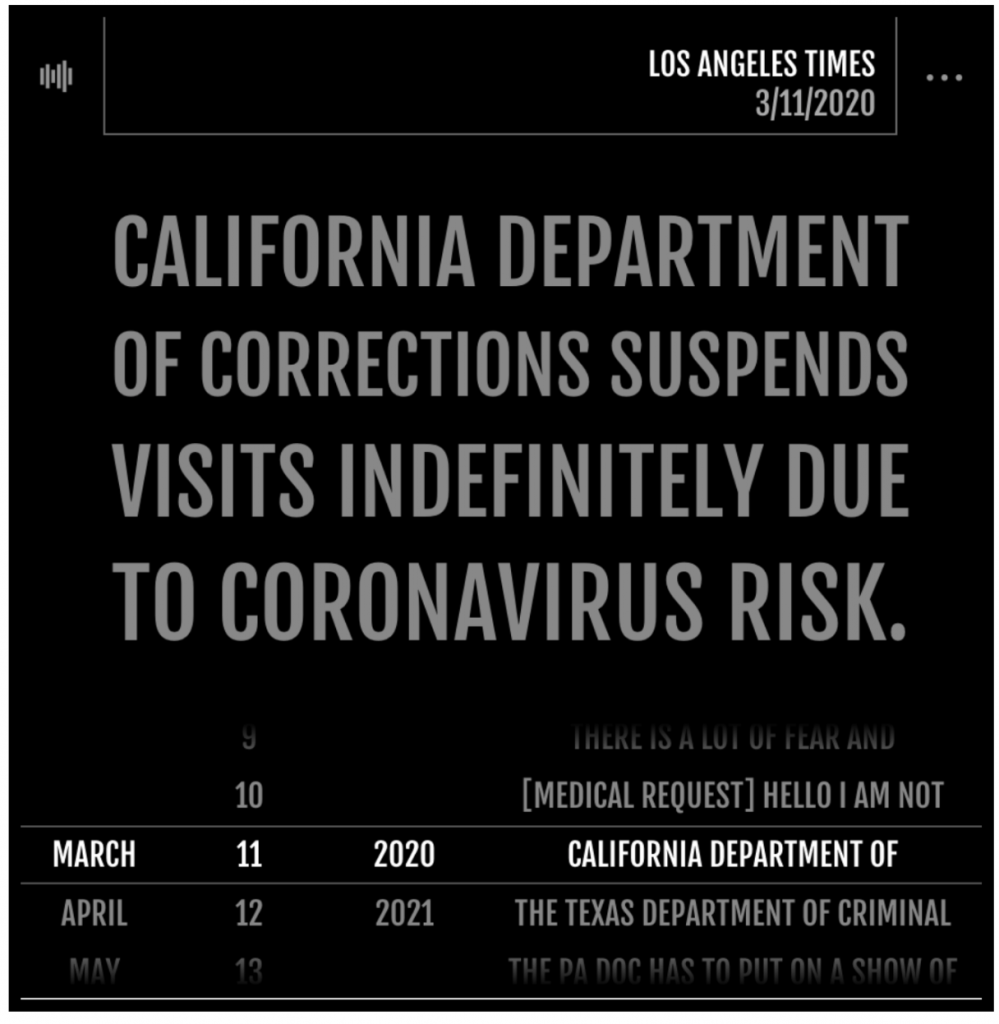 The Incarcerated Care project brought together UCSC social scientists, film and digital media makers with local community groups to study and document health care needs and challenges of California state jails and prisons. In the midst of the COVID-19 pandemic, the research expanded with the creation of EXPOSED (https://unjustlyexposed.com) overseen by Film & Digital Media Professor Sharon Daniel. Exposed documents the spread of COVID-19 over time inside prisons, jails, and detention centers across the United States, from the perspective of prisoners, detainees, and their families. In Summer 2021, the SJRC issued fellowships to 3 undergraduates and 1 graduate researcher to continue contributing to the interactive documentary. Previous undergraduate researchers came from – psychology, legal studies, feminist studies, cognitive science, politics and Critical Race and Ethnic Studies–to work on the project.
The Incarcerated Care project brought together UCSC social scientists, film and digital media makers with local community groups to study and document health care needs and challenges of California state jails and prisons. In the midst of the COVID-19 pandemic, the research expanded with the creation of EXPOSED (https://unjustlyexposed.com) overseen by Film & Digital Media Professor Sharon Daniel. Exposed documents the spread of COVID-19 over time inside prisons, jails, and detention centers across the United States, from the perspective of prisoners, detainees, and their families. In Summer 2021, the SJRC issued fellowships to 3 undergraduates and 1 graduate researcher to continue contributing to the interactive documentary. Previous undergraduate researchers came from – psychology, legal studies, feminist studies, cognitive science, politics and Critical Race and Ethnic Studies–to work on the project.
Additionally, SJRC affiliated faculty Sharon Daniel taught a collaborative course, “Reasonable Doubts: Making an Exoneree” with Professor of Government and Law at Georgetown Marc Howard and his childhood friend, Adjunct Professor Marty Tankleff, who was himself wrongfully convicted and incarcerated for almost 18 years before being exonerated. Howard and Tankleff developed Georgetown’s Making an Exoneree course in 2018, and its students have already won the release of three men and made significant progress in the legal prospects of several others. For the current 2022 class, the original crimes and convictions of five people were re-investigated, and students painstakingly documented the main issues, challenges, injustices, and stories involved in each case, producing short documentary films, interactive documentaries, and social media campaigns designed to provide humanizing portraits of the incarcerated people’s lives and complicated legal cases. For more on “Making an Exoneree,” read a recent news article here or, contact Sharon Daniel.
Just Biomedicine
Just Biomedicine is a UC Santa Cruz-based research collective that examines the meeting of biomedicine, biotechnology, and big data along the Third Street corridor in the Mission-Bay neighborhood of San Francisco. Many hope that this convergence will democratize access to health information and produce revolutionary new medical treatments that new companies will make available to the public through market mechanisms. Yet, as in other domains, living with technoscientific transformations over time reveals how they produce new inequalities and injustices: new challenges to democratic governance; new surveillance regimes; and new forms of social stratification.
The team continued presenting their findings at other academic institutions and professional academic associations. In August 2021, graduate student researcher Dennis Browe (sociology) presented at the American Sociological Association.
SJRC Director Jenny Reardon continued her service on the advisory board for the Center for ELSI Resources and Analysis (CERA). CERA is a new national center establishing a reliable online platform for scientists, scholars, policymakers, journalists and the general public to learn about the ethical, legal and social implications of genetics and genomics (ELSI) and fostering a community of multi-disciplinary researchers focused on ELSI research. CERA is funded by the National Human Genome Research Institute (NHGRI) at the National Institutes of Health (NIH) and co-led by the Stanford Center for Biomedical Ethics and the Division of Ethics at Columbia University in partnership with The Hastings Center and the Personal Genetics Education Project at Harvard University by Co-Principal Investigators Mildred Cho (Associate Director Stanford Center for Biomedical Ethics) and Sandra Soo-Jin Lee (Chief, Division of Ethics Department of Medical Humanities and Ethics at Columbia University). To get involved, contact Jenny Reardon.
Following the April 2019 meeting at the Pontifical Academy of Sciences at The Vatican on the future of genomic medicine, Reardon published an essay entitled, Thoughtful Genomics in the edited book published by Oxford University that arose from the meeting, Can Precision Medicine Be Personal? Can Precision Medicine Be Precise? More on the book can be found in Appendix 4.
Leadership in the Ethical and Equitable Design of STEM research (LEED)
Increasingly public and private funders recognize the critical importance of incorporating ethical and societal analysis into the design of science, technology, engineering, and math (STEM) research. Despite this growing demand, there is little guidance on best practices for fostering this integration or for evaluating its effects. This initiative—a national and international collaboration—aims to clarify, review, and revitalize the roles and value of engaging bioethicists and scholars in the social sciences, humanities, and the arts in STEM research. It proceeds in three phases: background research; drafting of LEED Principles and Practices; and International Discussion and Write-Up of LEED Principles and Practices. If you would like to take part in or contribute to this project, email Jenny Reardon. Learn more.
The Pandemicene: Re-Worlding Towards Justice
The Science & Justice project The Pandemicene still catches the attention of the public. Amid the global COVID-19 pandemic crisis, our particular commitment at Science & Justice remained to help build spaces where our partners and friends from around the planet could think and re-world together. During 2020-2021, Pandemicene students produced 13 podcast episodes, aired on KZSC 88.1FM and Spotify, that addressed overlapping topics of institutions of care, genomics, health and society, and how– practically–to re-world towards justice at this critical historical juncture. To get involved, contact Jenny Reardon.
Queer Ecologies Research Cluster
Queer Ecologies is a group led by Training Program Fellows Paloma Medina (now alum) and Dennis Browe. The cluster investigates how sexuality and concepts of nature have been historically linked. In particular, they are interested in how evolutionary and ecological science has informed what is “natural” and how we use this information to delineate certain sexual behaviors as normal or aberrant. Queer Ecologies seeks to examine the historical making of the natural as it relates to sexuality while communicating the overwhelming diversity of sex and gender in biology. The cluster looks forward to resuming gatherings in the coming year. To get involved, please contact Dennis Browe.
Race, Empire, and the Environments of Biomedicine
Thanks to a generous grant from The Andrew W. Mellon Foundation, over the next two years, through a seminar working group led by Professors Jennifer Derr (History) and Jenny Reardon (Sociology), faculty and students at UC Santa Cruz will have a chance to critically investigate the relationships among medicine, race, and the environment both in the United States and in other regions of the globe shaped by the influence of American medicine. The project will hire graduate students and a one-year postdoctoral scholar.
The Andrew W. Mellon Foundation Sawyer Seminar on “Race, Empire, and the Environments of Biomedicine” will host public lectures, scholarly talks, and a regular interdisciplinary reading and discussion group, the seminar will interrogate the intersections among race, empire, and the environment, and their significance in the theory, practice, and structure of American biomedicine. The seminar’s geographic frame is that of the American biomedical empire, a formation that includes the United States as well as those places formed by and encircled in the networks of American (biomedical) imperial influence. Within these geographies, race has functioned as a determinant of environmental exposures with deleterious impacts on human health. It also has been a central component of the environmental imaginaries that undergird the theory and practice of medicine and the provision of care. The seminar will approach the history and study of biomedicine from the vantage point of its racialized environments with an eye towards how these critical engagements might be marshaled to produce a more equitable practice of medicine. It is rooted in the proposition that to fully grasp the significance of race in medicine, we must probe how race is made material through environmental imaginaries, practices, and material entanglements, and how these in turn undergird and shape American biomedicine. Learn more at this campus news article or contact Jennifer Derr.
Theorizing Race After Race
Launched in 2018-2019 by SJRC Founding Director Jenny Reardon and SJRC affiliate and Assistant Professor of Sociology Camilla Hawthorne, the working group, Theorizing Race after Race (TRaR) continued seeking to develop a framework for grappling with reconfigurations of race after the supposedly ‘post-racial’ moment. Their goal is to understand how knowledge of the genome and ideas of human difference circulate, taking on different meanings across diverse historical-geographical contexts. The group convened several meetings throughout the academic year with campus scholars and developed a publication plan including a series of dialogues on COVID-19 and Racism.
During August 2021, TRAR student researchers hosted a third dialogue with four scholars from around the Americas discussing how COVID-19 has revivified or changed existing debates about race and racism in different trans/national contexts. This dialogue has been posted to The Foundry as Race, Contagion, and the Nation: A Dialogue with Pedro Valdez, Abril Saldaña-Tejeda, Felicity Amaya Schaeffer, and Jenny Reardon. The first two dialogues, posted last year on UCHRI’s Foundry site, cover Black geographies of quarantine and Metrics, enumeration, and the politics of knowledge. To get involved, contact Jenny Reardon and Camilla Hawthorne.
Sociology and Science, Technology, and Society Studies Pathways Project
Focusing on sociology and science, technology, and society studies, the Pathways Project, engages transdisciplinary thought and collaboration, and the critical skills needed for building our capacities to address problems of our time that span disciplines and areas of practice. The broader mission of the Pathways Project seeks to engage undergraduate students in robust intellectual linkages between the social sciences, African Diaspora Studies, history, politics, and genomic science to better understand the question of diversity. For more information, contact James Doucet-Battle.
Appendix 4: SJRC Publications Launched in 2021-2022
Assuming the Ecosexual Position: The Earth as Lover (University of Minnesota Press, 2021)
In 2008, S&J affiliated faculty Annie Sprinkle and Beth Stephens married the Earth, setting them on the path to explore the realms of ecosexuality. Assuming the Ecosexual Position describes how the two came together as lovers and collaborators, how they took a stand against homophobia and xenophobia, and how this union led to the miraculous conception of the Love Art Laboratory, their seven-year art and exhibition project with performance artists Linda M. Montano, Guillermo Gómez-Peña, and feminist pornographer Madison Young.
Stephens and Sprinkle share the process of making interactive performance art, celebrating their vows to love, honor, and cherish the many elements of the Earth. The collaboration between Sprinkle, Stephens, their diverse communities, and the Earth opens gender and sexuality, and art and environmentalism to the infinite possibilities and promise of love.
As written in CNN, Stephens and Sprinkle’s “collaborative projects bring joy amid injustice and hardship… make saving the planet a bit sexier.” The book launch is planned as another joyful project in the struggle against climate change.
Can precision medicine be personal; Can personalized medicine be precise? (Oxford University Press, 2022)
People have always sought medical care that is tailored to every individual patient. Alongside with the historical development of institutions of care, the vision of personal and ‘holistic’ care persisted. Patient-centred medicine, interpersonal communication and shared decision making have become central to medical practice and services.
This evolving vision of ‘personalized medicine’ is in the forefront of medicine, creating debates among ethicists, philosophers and sociologists of medicine about the nature of disease and the definition of wellness, the impact on the daily life of patients, as well as its implications on low-income countries. Is increased ‘precision’ also an improvement on the personal aspects of care or erosion of privacy? Do ‘precise’ and ‘personalized’ approach marginalize public health, and can this care be personalized without attention to culture, economy and society?
Can precision medicine be personal; Can personalized medicine be precise? provides a multidisciplinary and interdisciplinary discussion of the ethos and ethics of precision/personal medicine, involving scientists who have shaped the field, in dialogue with ethicists, social scientists and philosophers of science. The contributing scholars come from all over the world and from different cultural backgrounds providing reflective perspectives of history of ideas, critical theory and technology assessment, together with the actual work done by pioneers in the field. It explores issues such as global justice, gender, public health, pharmaceutical industry, international law and religion, and explores themes discussed in relation to personalized medicine such as new-born screening and disorders of consciousness.
Edited by Y. Michael Barilan, Margherita Brusa, and Aaron Ciechanover with contribution by Professor of Sociology and SJRC Founding Director Jenny Reardon from their participation in the workshop, “The Revolution of Personalized Medicine: Are We Going to Cure All Diseases and at What Price?,” that took place April 8-9, 2019 in Vatican City.
Read more in this campus news article: Jenny Reardon participates in Vatican workshop on personalized medicine.
Contesting Race and Citizenship: Youth Politics in the Black Mediterranean (Cornell University Press, 2022)
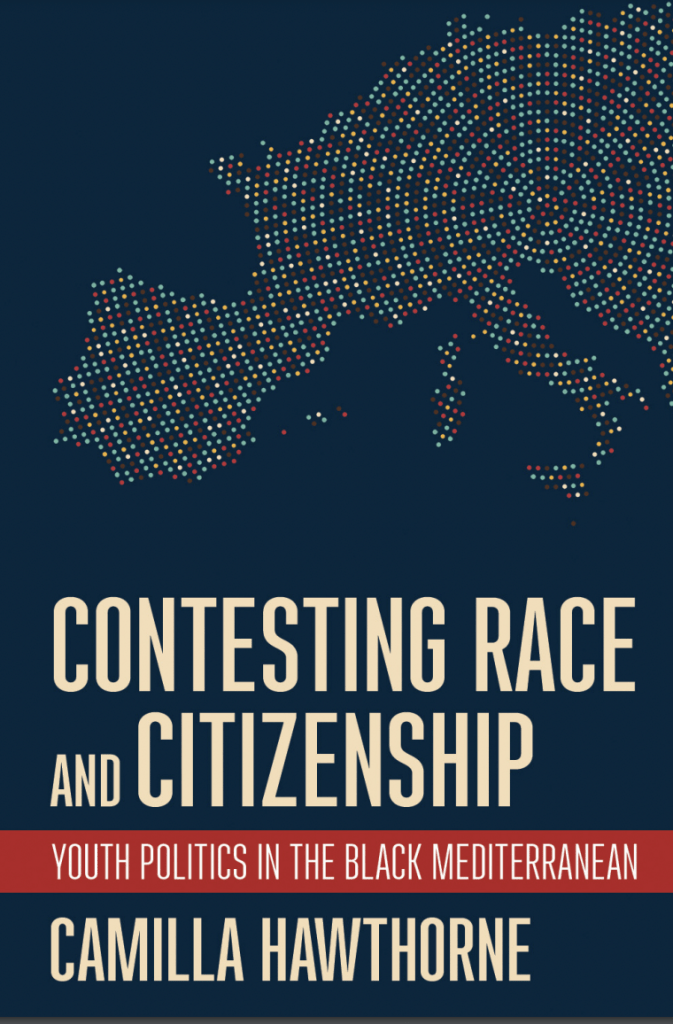
Contesting Race and Citizenship: Youth Politics in the Black Mediterranean (Cornell University Press, 2022)
Contesting Race and Citizenship is an original study of Black politics and varieties of political mobilization in Italy. Although there is extensive research on first-generation immigrants and refugees who traveled from Africa to Italy, there is little scholarship about the experiences of Black people who were born and raised in Italy. SJRC affiliated faculty Camilla Hawthorne focuses on the ways Italians of African descent have become entangled with processes of redefining the legal, racial, cultural, and economic boundaries of Italy and by extension, Europe itself.
Contesting Race and Citizenship traces not only mobilizations for national citizenship but also the more capacious, transnational Black diasporic possibilities that emerge when activists confront the ethical and political limits of citizenship as a means for securing meaningful, lasting racial justice—possibilities that are based on shared critiques of the racial state and shared histories of racial capitalism and colonialism.
More information can be found at: https://www.cornellpress.cornell.edu/book/9781501762291/contesting-race-and-citizenship.
The open-access ebook version can be downloaded at: https://d119vjm4apzmdm.cloudfront.net/open-access/pdfs/9781501762307.pdf
Life as We Made It: How 50,000 Years of Human Innovation Refined—and Redefined—Nature (Basic Books, 2021)

Life as We Made It: How 50,000 Years of Human Innovation Refined—and Redefined—Nature (Basic Books, 2021)
When the 2020 Nobel Prize was awarded to the inventors of CRISPR, the revolutionary gene-editing tool, it underlined our amazing and apparently novel powers to alter nature. But as biologist S&J affiliated faculty Beth Shapiro argues in Life as We Made It, this phenomenon isn’t new. Humans have been reshaping the world around us for ages, from early dogs to modern bacteria modified to pump out insulin. Indeed, she claims, reshaping nature—resetting the course of evolution, ours and others’—is the essence of what our species does.
In exploring our evolutionary and cultural history, Shapiro finds a course for the future. If we have always been changing nature to help us survive and thrive, then we need to avoid naive arguments about how we might destroy it with our meddling, and instead ask how we can meddle better.
Learn more about Life as We Made It in this campus news article: https://news.ucsc.edu/2021/10/shapiro-book.html
Listen to the book trailer at: https://twitter.com/bonesandbugs/status/1449073227569897479?s=12
Poetic Operations: Trans of Color Art in Digital Media (Duke University Press, 2022)
In Poetic Operations S&J affiliated faculty, artist and theorist micha cárdenas considers contemporary digital media, artwork, and poetry in order to articulate trans of color strategies for safety and survival. Drawing on decolonial theory, women of color feminism, media theory, and queer of color critique, cárdenas develops a method she calls algorithmic analysis. Understanding algorithms as sets of instructions designed to perform specific tasks (like a recipe), she breaks them into their component parts, called operations. By focusing on these operations, cárdenas identifies how trans and gender-non-conforming artists, especially artists of color, rewrite algorithms to counter violence and develop strategies for liberation. In her analyses, cárdenas shows how algorithmic analysis provides new modes of understanding the complex processes of identity and oppression and the intersection of gender, sexuality, and race.
The book is available as a Kindle Edition on Amazon. Other formats are available at https://www.dukeupress.edu/poetic-operations
Seeing Silicon Valley: Life inside a Fraying America (University of Chicago Press, 2021)
It’s hard to imagine a place more central to American mythology today than Silicon Valley. To outsiders, the region glitters with the promise of extraordinary wealth and innovation. But behind this image lies another Silicon Valley, one segregated by race, class, and nationality in complex and contradictory ways. Its beautiful landscape lies atop underground streams of pollutants left behind by decades of technological innovation, and while its billionaires live in compounds, surrounded by redwood trees and security fences, its service workers live in their cars.
With arresting photography and intimate stories, acclaimed photographer Mary Beth Meehan and Silicon Valley culture expert and SJRC affiliated faculty Fred Turner (Stanford, Communication) join forces to give us an unseen view of the heart of the tech world in their new book Seeing Silicon Valley: Life inside a Fraying America (University of Chicago Press, 2021). Seeing Silicon Valley makes this hidden world visible. Instead of young entrepreneurs striving for efficiency in minimalist corporate campuses, we see portraits of struggle—families displaced by an impossible real estate market, workers striving for a living wage, and communities harmed by environmental degradation. If the fate of Silicon Valley is the fate of America—as so many of its boosters claim—then this book gives us an unvarnished look into the future.
The book is available from the University of Chicago Press.
Unsettled Borders: The Militarized Science of Surveillance on Sacred Indigenous Land (Duke University Press, August 2022)
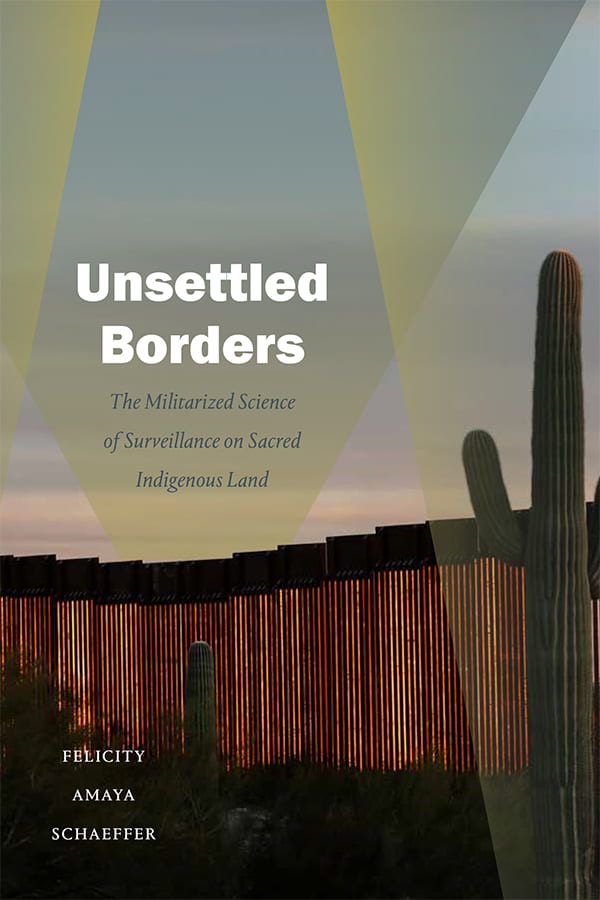
Unsettled Borders: The Militarized Science of Surveillance on Sacred Indigenous Land (Duke University Press, 2022)
In Unsettled Borders SJRC affiliate faculty Felicity Amaya Schaeffer (Feminist Studies) examines the ongoing settler colonial war over the US-Mexico border from the perspective of Apache, Tohono O’odham, and Maya who fight to protect their sacred land. Schaeffer traces the scientific and technological development of militarized border surveillance across time and space from Spanish colonial lookout points in Arizona and Mexico to the Indian wars, when the US cavalry hired Native scouts to track Apache fleeing into Mexico, to the occupation of the Tohono O’odham reservation and the recent launch of robotic bee swarms. Labeled “Optics Valley,” Arizona builds on a global history of violent dispossession and containment of Native peoples and migrants by branding itself as a profitable hub for surveillance. Schaeffer reverses the logic of borders by turning to Indigenous sacred sciences: ancestral land-based practices that are critical to reversing the ecological and social violence of surveillance, extraction, and occupation.
Learn more about Unsettled Borders in this campus news article:
https://news.ucsc.edu/2022/07/felicity-schaeffer-unsettled-borders.html
Appendix 5: SJRC Funders
Since 2004, the SJRC has helped faculty across campus raise over $10 million in grants for collaborative research including training grants by the National Science Foundation, National Institutes for Health and California Institute for Regenerative Medicine (CIRM). Below is a summary of active awards. A full breakdown of external and internal grants and gifts can be found in Appendix 8: Key Accomplishments.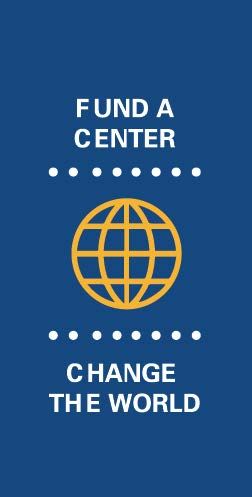
Current Funded Initiatives
LEED: Leadership in the Equitable and Ethical Design of Science and Engineering
Funding Agency: National Science Foundation ER2-Ethical & Responsible Research
Principal Investigator: Jenny Reardon
Amount: $399.994
LEED: Leadership in the Equitable and Ethical Design of Science and Engineering
Funding Agency: The UCSC Institute for Social Transformation; Sprout Grant
Principal Investigator: Jenny Reardon
Amount: $9,600
LEED: Leadership in the Equitable and Ethical Design of Science and Engineering
Funding Agency: The UCSC Office of Research, SEED Grant
Principal Investigator: Jenny Reardon
Amount: $14,444
Race, Empire, and the Environments of Biomedicine
Funding Agency: Andrew W. Mellon Foundation
Principal Investigator: Jennifer Derr, with Co-PI Jenny Reardon
Amount: $225,000
Science and Justice Minor Research and Planning Cluster
Funding Agency: The UCSC Office of Research, SEED Grant
Principal Investigator: Christine Hong, with Co-PI Jenny Reardon
Amount: $40,000 (applied) (awarded by Division of Humanities)
Building Sociology and Science and Technology Studies
Funding Agency: The UCSC Committee on Research, Faculty Research Grant
Principal Investigator: James Doucet-Battle
Amount: $2,000
Building Sociology and Science and Technology Studies
Funding Agency: The UCSC Institute for Social Transformation; Sprout Grant
Principal Investigator: James Doucet-Battle
Amount: $12,000
The UCSC Center for Orphan-disease Alternative Splicing Therapeutics (C.O.A.S.T.)
Funding Agency: UC Santa Cruz center-scale seed funding initiative
Principal Investigator: Michael Stone
Amount: $75,000 (Office of Research $60,000) and (Physical and Biological Sciences $15,000)
EDUC 4: CIRM Research Training Grant “CIRM Scholar” Awards
Funding Agency: California Institute for Regenerative Medicine (CIRM)
Principal Investigator: Institute for the Biology of Stem Cells: Camilla Forsberg, Co-PI: Lindsay Hinck
Amount: $4,913,271 ($2,500 SJRC portion)
Major Sponsors
Department of Sociology
Division of Graduate Studies
Division of Humanities
Division of Physical & Biological Sciences
Division of Social Sciences
The UC Santa Cruz Office of Research
The UC Santa Cruz Institute for Social Transformation; Sprout Grant
Appendix 6: SJRC 2021-2022 Org Chart
SJRC Org Chart 2021-2022 (PDF)
Appendix 7: SJRC Faculty Affiliates at UC Santa Cruz
The Science & Justice Research Center (SJRC) partners with multiple regional and international units to provide a discipline-neutral space to freely express and address areas of common concern through facilitated discussions, student exchanges, research, and training. Find out more about how affiliates support the Center.
UCSC Affiliated Faculty
SJRC Affiliated Faculty add to the liveliness of the S&J Community.
Elliot Anderson, Art
Hillary Angelo, Sociology
Neda Atanasoski, Feminist Studies
Karen Barad, Feminist Studies, History of Consciousness, and Philosophy
Chris Benner, Environmental Studies, Sociology
Micha Cárdenas, Art and Design: Games and Playable Media
Nancy Chen, Anthropology
Sharon Daniel, Film & Digital Media
Jennifer Derr, History
Lindsey Dillon, Sociology
James Doucet-Battle, Sociology
Madeleine Fairbairn, Environmental Studies
Lars Fehren-Schmitz, Anthropology
Lise Getoor, Computer Science
Julie Guthman, Community Studies
Kathleen (Kat) Gutierrez, History
Camilla Hawthorne, Sociology
Dee Hibbert-Jones, Digital Art and New Media
Zia Isola, Center for Biomolecular Science & Engineering
Andrew Mathews, Anthropology
Jaimie Morse, Sociology
Tamara Pico, Earth and Planetary Sciences
Jenny Reardon, Sociology
Warren Sack, Digital Arts and New Media
Beth Shapiro, Ecology and Evolutionary Biology
Matt Sparke, Politics
Beth Stephens, Art, E.A.R.T.H. Lab
Susan Strome, Molecular Cell & Developmental Biology
Anna Tsing, Anthropology
Anjuli Verma, Politics
UCSC Steering Committee
Members of the SJRC Steering Committee serve for 1 academic year (renewable). The committee advises the Center on its research, community involvement, programing, and building the Science and Justice platform. It also reviews committee members and assignments, the Center’s research themes, events, visiting scholars, and steers the Center’s overall programing. The committee meets twice per term.
Jennifer Derr, History
James Doucet-Battle, Sociology
Lars Fehren-Schmitz, Anthropology
Lise Getoor, Computer Science
Dee Hibbert-Jones, Digital Art and New Media
Jaimie Morse, Sociology
Jenny Reardon, Sociology
Matt Sparke, Politics
Internal Advisory Board
Members of the SJRC Advisory Board serve for 3 academic years (renewable).Board members advise the Center on institutional support and fundraising, cultivate connections and synergy amongst partners, and help forge the overall Center vision and plans. The Board meets annually in Spring.
Elliot Anderson, Art
Karen Barad, Professor of Feminist Studies
Ed Green, Biomolecular Engineering
Zia Isola, Center for Biomolecular Science & Engineering
Warren Sack, Digital Arts & New Media
Anna Tsing, Anthropology
External Advisory Board
Geoffrey Bowker, Bioinformatics, University of California – Irvine
Joe Dumit, Anthropology, University of California – Davis
Sally Lehrman, SJRC Visitor
Laura Mamo, Health Equity Institute, San Francisco State University
Janet Shim, School of Nursing, University of California – San Francisco
Kim TallBear, Native Studies, University of Alberta, Canada
Fred Turner, Communications, Stanford
Appendix 8: SJRC Key Accomplishments
Key Accomplishments (eg: external and internal funding, grants, press coverage, research collaborations) can be found here.

